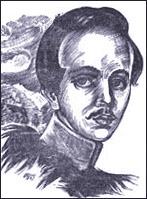|
Through foreign country long I walk'd,
Of Dnieper's hosts the grey-haired bard,
And then home-sickeness in me talk'd,
And I resolved to turn home-ward.
And with my psalt'ry came I back,
The song of bygone times replay'd...
But native land's new prince – alack! –
The orders of the Khan obey'd!..
In desert, where appear'd the foe,
In anguish bore I old my head,
And ever seemed it as though
On bloodied grass my feet would tread.
To bones already lying bare
Did crowds of birds and beasts arrive,
Since greater was the number there
Of those desease'd than those alive.
Who of one song could sing a word?
With a despairing motion pull'd
I used to hit a quivering chord
And force a sound, by grievance rule'd;
But e'er so quickly did it die!
And if a son of chains were near
That disappearing freedom cry,
It would have touched not his ear.
Then asked somebody of me:
"What for you're full of tears and gloom,
Where ever man could live as free,
Of whom you strum and sing of whom?"
Did pierce through me the speech's sound
And cut my hopes' remaining root;
The psalt'ry threw I on the ground
And broke in silence with my foot.
|
Я долго был в чужой стране,
Дружин Днепра седой певец,
И вдруг пришло на мысли мне
К ним возвратиться наконец.
Пришел – с гуслями за спиной –
Былую песню заиграл...
Напрасно! – князь земли родной
Приказу ханскому внимал...
В пустыни, где являлся враг,
Понес я старую главу,
И попирал мой каждый шаг
Окровавленную траву.
Сходились к брошенным костям
Толпы зверей и птиц лесных,
Затем, что больше было там
Число убитых, чем живых.
Кто мог бы песню спеть одну?
Отчаянным движеньем рук
Задев дрожащую струну,
Случалось, исторгал я звук;
Но умирал так скоро он!
И если б слышал сын цепей,
То гибнущей свободы стон
Не тронул бы его ушей.
Вдруг кто-то у меня спросил:
"Зачем я часто слезы лью,
Где человек так вольно жил?
О ком бренчу, о ком пою?"
Пронзила эта речь меня –
Надежд пропал последний рой;
На землю гусли бросил я
И молча раздавил ногой.
1830
|

